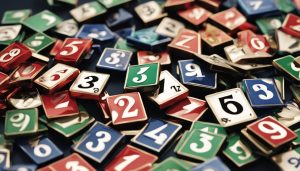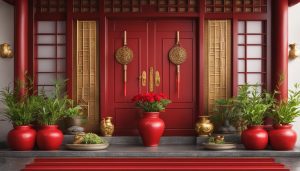When buying a new home, you may find yourself considering various factors to ensure a smooth transition and a happy future. But have you ever thought about the role that good luck plays in this process? Many cultures hold beliefs and superstitions surrounding luck, and understanding them can help guide your decisions and potentially enhance your luck when purchasing a new home.
Superstitions and traditions associated with good luck in real estate vary across different cultures. Numerology is one aspect that is widely considered, with specific numbers believed to bring luck or misfortune. Additionally, following rituals and traditions, such as burying a statue of St. Joseph or following Feng Shui principles, are believed to attract positive energy and enhance luck in your new home.
So, whether you’re exploring lucky numbers, performing rituals, or incorporating Feng Shui principles, understanding the concept of good luck when buying a new home can help you create a harmonious and prosperous living environment. Let’s dive deeper into these fascinating beliefs and practices.
Contents
- 1 Numerology and Its Influence on Real Estate Superstitions
- 2 Following Rituals and Traditions for Good Luck
- 3 Feng Shui Principles for Designing a Home for Good Luck
- 4 Conclusion
- 5 FAQ
- 5.1 Can superstitions and beliefs about good luck influence the purchase of a new home?
- 5.2 How does numerology affect real estate superstitions?
- 5.3 What are some rituals and traditions associated with good luck when buying a new home?
- 5.4 Are there any signs and symbols of good luck to look for in a new home?
- 5.5 How can you design a home for good luck according to Feng Shui principles?
- 5.6 What are some tips for attracting good luck when purchasing a new home?
- 6 Source Links
Key Takeaways:
- Good luck beliefs and superstitions play a role in real estate.
- Numerology can influence the perception of luck in different cultures.
- Following rituals and traditions, such as burying a statue of St. Joseph or applying Feng Shui principles, can enhance luck when buying a new home.
- Signs and symbols of good luck, like water bodies and avoiding certain locations, are considered in real estate
- Designing a home based on Feng Shui principles can attract good luck and positive energy.
Numerology and Its Influence on Real Estate Superstitions
Numerology is a significant factor in real estate superstitions, with different numbers believed to bring either luck or misfortune in various cultures. Understanding these numerological beliefs can help buyers navigate the real estate market and potentially enhance their luck when buying a new home.
In North American culture, the number 13 is widely viewed as unlucky, while the number 7 is considered lucky. However, in Chinese culture, the number 8 is highly regarded as lucky due to its association with good fortune and prosperity. On the other hand, the number 4 is considered unlucky because it sounds similar to the word for “death” in Chinese. Similar beliefs exist in Jewish, Hindu, Muslim, Russian, and Italian cultures.
These numerological superstitions can influence various aspects of the real estate market, including the pricing of properties and the numbering of floors in buildings. Some buyers may prefer to avoid properties that do not align with their belief in lucky numbers, while others may be drawn to properties that are associated with fortunate numbers. By being aware of these cultural superstitions, buyers can make informed decisions and potentially increase their chances of finding a home that aligns with their beliefs and attracts positive energy.
| Culture | Lucky Numbers | Unlucky Numbers |
|---|---|---|
| North American | 7 | 13 |
| Chinese | 8 | 4 |
| Jewish | 18 | 10 |
| Hindu | 3, 9 | 4 |
| Muslim | 99 | 13 |
| Russian | 7, 8 | 6 |
| Italian | 13 | 17 |
These beliefs may not be universally shared within each culture and should be taken as general observations rather than strict guidelines. However, they provide an interesting insight into the diverse ways in which superstitions and numerology can shape the real estate market and buyer decisions. By considering these numerological superstitions, buyers can make choices that align with their beliefs and potentially enhance their luck when purchasing a new home.
“Understanding numerological superstitions can help buyers navigate the real estate market and potentially enhance their luck when buying a new home.”
Following Rituals and Traditions for Good Luck
Rituals and traditions have long been believed to bring good luck when buying a new home. These practices are deeply rooted in various cultures and have been passed down through generations. By following these rituals, many homebuyers hope to invite positive energy and good fortune into their new homes.
One popular tradition is the belief in burying a statue of St. Joseph in the yard of the current home. This practice is said to help sell the current property and attract a new one. St. Joseph, known as the patron saint of real estate, is believed to bring luck and speed up the selling process. While the effectiveness of this ritual may vary, it has gained popularity among buyers looking for an extra boost of luck.
Another influential belief system is Feng Shui, an ancient Chinese practice that focuses on harmonizing energy flow in a space. When it comes to buying a house, Feng Shui principles are often considered to attract good luck and positive energy. Homebuyers may consult with Feng Shui experts or refer to guides and tips on how to choose a house with optimal energy flow. Factors such as the location of the house, its surroundings, and the neighborhood are taken into account to ensure a harmonious and lucky living environment.
“The house is a machine for living.” – Le Corbusier
The history of a home can also play a role in its perceived luck. Some people believe that homes with a history of negative events, such as accidents or financial troubles, may carry negative energy. Avoiding homes with such histories is believed to help prevent bad luck and promote a more positive living experience. However, it’s crucial to note that these beliefs are subjective and vary from person to person.
Table: Comparing St. Joseph Statue and Feng Shui Traditions
| Tradition | St. Joseph Statue | Feng Shui |
|---|---|---|
| Luck Enhancement | Believed to bring good luck in selling and buying a home | Focuses on harmonizing energy flow for overall positive living |
| Practices | Burying a statue of St. Joseph in the yard of the current home | Considerations for location, surroundings, and neighborhood |
| Benefits | Potentially expedites the selling process | Creates a harmonious and lucky living environment |
| Subjectivity | Personal belief and effectiveness may vary | Interpretations and applications may differ |
Ultimately, whether one chooses to follow these rituals and traditions is a personal decision. Some may dismiss them as superstitions, while others find comfort and solace in these practices. The important thing is to create a home that feels right for you and brings joy and positivity into your life.

Feng Shui Principles for Designing a Home for Good Luck
When it comes to creating a home that attracts good luck and positive energy, following Feng Shui principles can be incredibly beneficial. Feng Shui is an ancient Chinese practice that emphasizes the harmonious flow of energy, or chi, within a space. By incorporating specific design elements, you can enhance the overall luck and positive vibes in your new home.
Home Shape
In Feng Shui, the shape of your home plays a significant role in attracting good luck. Symmetric square shapes are believed to be the most auspicious as they promote balance and harmony. These shapes are thought to enhance positive energies and create a sense of stability throughout the home.
Entryway Design
The entryway of your home is the first impression and the gateway for positive energy to enter. Ensuring that the entryway is welcoming and free of any obstacles is crucial. Make sure the space is well-lit and clutter-free, allowing the chi to flow freely. Hang a beautiful piece of artwork or place a vibrant plant near the entrance to invite positive energy into your home.
Landscaping as per Feng Shui
Consider incorporating Feng Shui principles when designing your outdoor space. Position trees and shrubs strategically to create a sense of balance and harmony. Avoid placing large trees directly in front of your home, as they may block the flow of energy. Instead, opt for a landscape that allows for open spaces and gentle curves, mimicking the natural flow of chi.
| Design Element | Description |
|---|---|
| Symmetric Square Shape | Believed to enhance positive energies and create balance and stability. |
| Welcoming Entryway | Ensuring a clutter-free and well-lit entrance to invite positive energy. |
| Feng Shui Landscaping | Strategically positioning trees and shrubs to promote balance and harmony. |
By incorporating these Feng Shui principles into your home design, you can create a space that attracts good luck and positive energy. Remember that good luck is not about superstition alone but involves creating an environment that promotes harmony, balance, and positivity.

Conclusion
When it comes to buying a new home, there are various beliefs and superstitions about attracting good luck that can guide your decisions and rituals. Understanding numerological superstitions, following specific rituals like burying a St. Joseph statue, and considering Feng Shui principles are some tips that can potentially enhance your luck when purchasing a new home.
It’s also important to take into account signs and symbols of good luck. For example, having a water body near your house is considered auspicious in Feng Shui, while living near a cemetery or T-junction is believed to bring bad luck. Additionally, a good neighborhood with positive energy can contribute to the overall luck and positive vibes of your new home.
Designing your home according to Feng Shui principles can also attract good luck. Pay attention to the shape of the home, the entryway, and the landscaping. Symmetric square shapes are preferred for their ability to enhance positive energies, while a welcoming and obstacle-free entryway allows the flow of positive energy. Thoughtful landscaping, including the placement of trees and shrubs, can also contribute to a harmonious environment.
By keeping these tips in mind, you can create a home that not only meets your practical needs but also provides a positive and harmonious environment that enhances your luck. Happy house hunting and may good luck be with you in your new home!
FAQ
Can superstitions and beliefs about good luck influence the purchase of a new home?
Yes, superstitions and beliefs about good luck can play a role in the decision-making process when buying a new home. Understanding these influences can help buyers make informed choices.
How does numerology affect real estate superstitions?
Different cultures have different beliefs about lucky and unlucky numbers. For example, the number 13 is often seen as unlucky in North American culture, while the number 8 is considered lucky in Chinese culture.
What are some rituals and traditions associated with good luck when buying a new home?
Some people believe in burying a statue of St. Joseph in their yard to help sell their current home and find a new one. Others follow Feng Shui principles, which involve considering the location, surroundings, and history of the home.
Are there any signs and symbols of good luck to look for in a new home?
Certain signs, such as having a water body near the house, are considered auspicious in Feng Shui. On the other hand, living near a cemetery or T-junction is often seen as inauspicious.
How can you design a home for good luck according to Feng Shui principles?
Following Feng Shui principles involves considering the shape of the home, having a welcoming entryway, and careful landscaping. These design choices are believed to attract positive energy and good luck.
What are some tips for attracting good luck when purchasing a new home?
Understanding numerological superstitions, following specific rituals and traditions, and considering signs and symbols of good luck can potentially enhance one’s luck when buying a new home. Designing the home according to Feng Shui principles is also believed to create a positive and harmonious environment.





